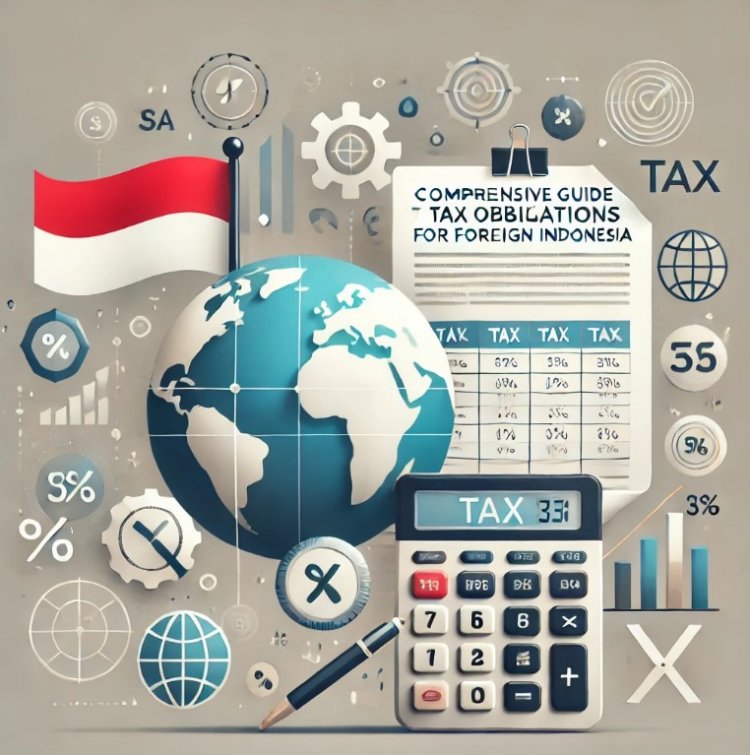Comprehensive Guide to Tax Obligations for Foreign Investors in Indonesia
This guide helps foreign investors navigate Indonesia's tax landscape, covering corporate taxes, VAT, personal income tax, and compliance strategies for legal and financial efficiency. Discover essential insights into tax obligations for foreign investors in Indonesia, including corporate income tax, VAT, withholding tax, and compliance tips to optimize investment outcomes

Comprehensive Guide to Tax Obligations for Foreign Investors in Indonesia
The Importance of Tax Compliance for Foreign Investors
Indonesia’s rapidly growing economy, strategic location, and abundant natural resources make it an attractive destination for foreign investors. However, along with these opportunities come complex tax regulations that require careful navigation. Understanding and complying with Indonesia’s tax obligations is essential to safeguard investments, optimize operational costs, and avoid legal complications.
This guide provides a comprehensive overview of key tax considerations, compliance requirements, and strategic tips for foreign investors in Indonesia.
Key Tax Categories for Foreign Investors
1. Corporate Income Tax (CIT)
Corporate Income Tax applies to businesses operating in Indonesia, including foreign-owned companies such as PT PMA (Penanaman Modal Asing or Foreign Investment Companies).
-
Standard Rate: 22% (may be reduced in certain cases).
-
Reduced Rates: For qualifying small enterprises with annual revenues below IDR 50 billion, a 50% reduction on the taxable income rate may apply.
-
Taxable Income: Includes income from operational activities, dividends, capital gains, and other earnings.
Key Consideration:
To optimize tax liability, foreign investors should ensure accurate bookkeeping and explore available incentives for specific industries.
2. Withholding Tax (WHT)
Indonesia imposes withholding taxes on various types of payments made to foreign entities.
-
Dividends, Interest, Royalties: Standard WHT rate is 20%.
-
Tax Treaty Benefits: Reduced rates may apply under Double Tax Avoidance Agreements (DTA) between Indonesia and the investor’s home country.
Example:
For a company based in a DTA-partner country, the WHT on royalties may be reduced to as low as 10%.
3. Value Added Tax (VAT)
VAT applies to the supply of most goods and services within Indonesia, including importation.
-
Standard VAT Rate: 11% (scheduled to increase to 12% in the coming years).
-
Exemptions: Certain essential goods and services, such as basic food products and financial services, are exempt.
4. Personal Income Tax (PIT)
Foreign investors who reside in Indonesia for more than 183 days within a 12-month period are subject to Indonesian PIT.
-
Tax Rates: Progressive rates ranging from 5% to 35% depending on income levels.
-
Non-Residents: Taxed at a flat rate of 20% on Indonesian-sourced income.
Important Tip:
Foreign executives or directors should carefully track their days of residence and consult tax advisors to determine their tax status.
Tax Incentives for Foreign Investors
Indonesia offers several tax incentives designed to attract foreign investments and stimulate economic growth:
-
Special Economic Zones (SEZs): Enjoy CIT reductions, VAT exemptions, and import duty waivers for certain industries.
-
Tax Holidays: Available for large-scale investments in priority sectors, offering CIT exemptions for up to 20 years.
-
Investment Allowances: Additional deductions for capital expenditures in specific sectors.
-
R&D Incentives: Enhanced deductions for research and development activities.
-
DTA Benefits: Reduced WHT rates and avoidance of double taxation for residents of DTA-partner countries.
Pro Tip:
Investors should conduct a thorough feasibility study to identify which incentives are applicable and structure their investment accordingly.
Compliance Obligations
1. Corporate Tax Reporting
-
Annual CIT Return (SPT): Due by the end of the fourth month following the fiscal year (typically April 30).
-
Monthly Tax Payments: Required for installments of CIT.
2. VAT Reporting
-
Monthly VAT reports must be submitted, with payments made by the end of the following month.
3. Withholding Tax Reporting
-
Withholding taxes must be reported and paid monthly.
4. Personal Income Tax Filing
-
Annual PIT returns are due by March 31 of the following year.
Key Risk:
Non-compliance can result in significant penalties, including fines and potential reputational damage.
Common Challenges and Risk Mitigation
-
Complex Tax Regulations: Indonesia’s tax laws frequently change, making compliance challenging.
-
Solution: Engage a local tax consultant to stay updated on regulatory changes.
-
-
Double Taxation: Risk of being taxed in both Indonesia and the investor’s home country.
-
Solution: Leverage DTA benefits and proper documentation.
-
-
Transfer Pricing Issues: Transactions between related entities may be scrutinized.
-
Solution: Maintain comprehensive transfer pricing documentation.
-
Strategic Tips for Effective Tax Management
-
1. Utilize DTA Benefits: Ensure proper documentation to qualify for reduced WHT rates.
-
2. Optimize Corporate Structure: Explore the use of holding companies in tax-efficient jurisdictions.
-
3. Maintain Accurate Records: Proper documentation is crucial for audits and accessing tax incentives.
-
4. Engage Professional Advisors: Partner with experienced tax and legal consultants to ensure compliance and risk mitigation.
Conclusion: Navigating Tax Obligations with Confidence
Navigating Indonesia’s tax obligations can be complex, but with proper planning and expert guidance, foreign investors can unlock the country's vast economic potential while staying compliant. Our law firm offers comprehensive tax advisory services to help investors optimize their tax strategies, manage compliance risks, and achieve business success.
Contact us today to learn how we can assist you in navigating Indonesia’s dynamic tax landscape.
What's Your Reaction?
















